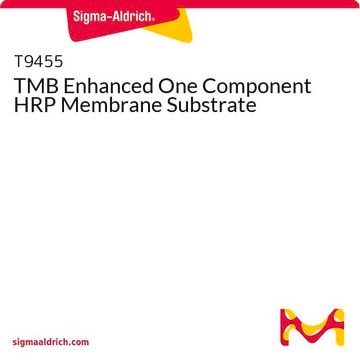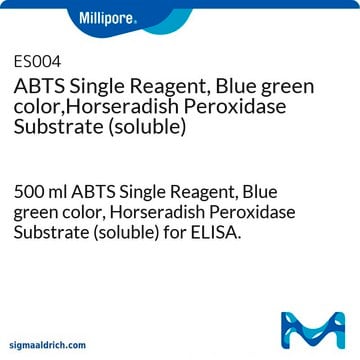ES022
TMB/E Ultra Sensitive, Blue, Horseradish Peroxidase Substrate (soluble)
100 ml TMB/E Ultra Sensitive, Blue, Horseradish Peroxidase Substrate (soluble) for ELISA & Immunohistochemistry.
Synonym(e):
HRP substrate, TMB
Anmeldenzur Ansicht organisationsspezifischer und vertraglich vereinbarter Preise
Alle Fotos(1)
About This Item
UNSPSC-Code:
41116010
eCl@ss:
42029053
NACRES:
NB.22
Empfohlene Produkte
Qualitätsniveau
Form
liquid
Hersteller/Markenname
Chemicon®
Methode(n)
ELISA: suitable
immunohistochemistry: suitable
λmax
450 nm
Versandbedingung
wet ice
Allgemeine Beschreibung
TMB, (3,3′,5,5′-tetramethybenzidine) has been shown to be a safe-sensitive substrate for the assay of HRP. Initially, in the presence of HRP and hydrogen peroxide, a one-electron oxidation product is formed. This compound, a cation free radical, is blue in color with an adsorption maximum of 653 nm. Further reaction with HRP/H2O2 or acidification of the radical with acid yields the diimine terminal oxidation product adsorbing light at 450 nm. The extinction coefficient of the radical (E653nm=3.9 x 104 mol-1 cm-1) and diimine (E450nm=5.9 x 104 mol-1 cm-1) provide a remarkably sensitive system for the assay of HRP and HRP labeled probes. ES022 is a single component reagent stable at room temperature and not sensitive to normal laboratory light. It is optimized with respect to TMB and hydrogen peroxide concentrations and yields a linear response with the concentrations of HRP usually employed in immunological assays.
Anwendung
METHOD SYNOPSIS:
After completion of analyte binding to a solid phase and reaction with a HRP labeled probe, ES022 is added. Oxidation of TMB produces a blue reaction product that is measured at 650 nm. The color formation as a function of time can be recorded or the reaction stopped with sodium fluoride after a fixed interval. Increased sensitivity can be achieved by converting the blue radical to the diimine by addition of acid. The resulting yellow color is measured immediately at 450 nm.
SAMPLE PROCEDURE:
1. Complete all required incubations with antibodies, probes, HRP labeled reagents.
2. Wash plate at least 4 times with PBS or Tris buffered saline containing 0.1% Tween-20.
3. After the final wash, shake and blot all residual buffer from plate wells.
4. Add 0.1 mL of ES022 (TMBE Solution) to appropriate wells and incubate 5-30 minutes.
Note: The reaction time will depend upon the activity of the HRP probe. If color develops too briskly, zero order kinetics will not prevail. Dilution of the probe, antibody or HRP labeled reagent may be required.
5. The reaction can be monitored as a function of time for kinetic assays or stopped with 0.1 mL of 0.3 Mol/L of sulphuric acid or 0.1% sodium fluoride and read at 450 nm.
6. If the procedure demands conversion to the yellow diimine, add 0.1 mL of either acid described in the reagent section above and record the absorbance within 5 minutes.
Variations of time, reagent volume and temperature require standardization by the user.
After completion of analyte binding to a solid phase and reaction with a HRP labeled probe, ES022 is added. Oxidation of TMB produces a blue reaction product that is measured at 650 nm. The color formation as a function of time can be recorded or the reaction stopped with sodium fluoride after a fixed interval. Increased sensitivity can be achieved by converting the blue radical to the diimine by addition of acid. The resulting yellow color is measured immediately at 450 nm.
SAMPLE PROCEDURE:
1. Complete all required incubations with antibodies, probes, HRP labeled reagents.
2. Wash plate at least 4 times with PBS or Tris buffered saline containing 0.1% Tween-20.
3. After the final wash, shake and blot all residual buffer from plate wells.
4. Add 0.1 mL of ES022 (TMBE Solution) to appropriate wells and incubate 5-30 minutes.
Note: The reaction time will depend upon the activity of the HRP probe. If color develops too briskly, zero order kinetics will not prevail. Dilution of the probe, antibody or HRP labeled reagent may be required.
5. The reaction can be monitored as a function of time for kinetic assays or stopped with 0.1 mL of 0.3 Mol/L of sulphuric acid or 0.1% sodium fluoride and read at 450 nm.
6. If the procedure demands conversion to the yellow diimine, add 0.1 mL of either acid described in the reagent section above and record the absorbance within 5 minutes.
Variations of time, reagent volume and temperature require standardization by the user.
Physikalische Form
Color Code: Gelb
REAGENT PROVIDED:
Liquid solution containing TMB, 2.08 μMol L(-1) and Hydrogen Peroxide, citric acid buffer at pH 3.3. Also contains non-toxic proprietary stabilizers.
MATERIALS REQUIRED: Reagents Required for Stopping the Reaction, But Not Provided
A. 0.3 Mol L sulphuric acid for stopping the reaction and preserving blue chromogen.
Note: Reagent grade water must contain less than 10(-7) Mol/L of iron or copper salts otherwise unreacted TMB will be converted non-enzymatically to the diimine.
Liquid solution containing TMB, 2.08 μMol L(-1) and Hydrogen Peroxide, citric acid buffer at pH 3.3. Also contains non-toxic proprietary stabilizers.
MATERIALS REQUIRED: Reagents Required for Stopping the Reaction, But Not Provided
A. 0.3 Mol L sulphuric acid for stopping the reaction and preserving blue chromogen.
Note: Reagent grade water must contain less than 10(-7) Mol/L of iron or copper salts otherwise unreacted TMB will be converted non-enzymatically to the diimine.
Lagerung und Haltbarkeit
Maintain at room temperature for up to six months. For long term storage, up to twelve months, maintain at 2-8°C. Protect from exposure to direct sunlight. Discard if solution is blue or turbid.
Warm to room temperature prior to use.
REAGENT PROVIDED: Liquid solution containing TMB, 2.08 mMol L(-1) and Hydrogen Peroxide, citric acid buffer at pH 3.3. Also contains non-toxic proprietary stabilizers.
Warm to room temperature prior to use.
REAGENT PROVIDED: Liquid solution containing TMB, 2.08 mMol L(-1) and Hydrogen Peroxide, citric acid buffer at pH 3.3. Also contains non-toxic proprietary stabilizers.
Rechtliche Hinweise
CHEMICON is a registered trademark of Merck KGaA, Darmstadt, Germany
Haftungsausschluss
Unless otherwise stated in our catalog or other company documentation accompanying the product(s), our products are intended for research use only and are not to be used for any other purpose, which includes but is not limited to, unauthorized commercial uses, in vitro diagnostic uses, ex vivo or in vivo therapeutic uses or any type of consumption or application to humans or animals.
Lagerklassenschlüssel
12 - Non Combustible Liquids
WGK
WGK 1
Flammpunkt (°F)
Not applicable
Flammpunkt (°C)
Not applicable
Analysenzertifikate (COA)
Suchen Sie nach Analysenzertifikate (COA), indem Sie die Lot-/Chargennummer des Produkts eingeben. Lot- und Chargennummern sind auf dem Produktetikett hinter den Wörtern ‘Lot’ oder ‘Batch’ (Lot oder Charge) zu finden.
Besitzen Sie dieses Produkt bereits?
In der Dokumentenbibliothek finden Sie die Dokumentation zu den Produkten, die Sie kürzlich erworben haben.
Kunden haben sich ebenfalls angesehen
Unser Team von Wissenschaftlern verfügt über Erfahrung in allen Forschungsbereichen einschließlich Life Science, Materialwissenschaften, chemischer Synthese, Chromatographie, Analytik und vielen mehr..
Setzen Sie sich mit dem technischen Dienst in Verbindung.








